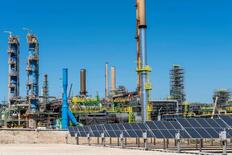- La Mède biorefinery started operations in July 2019 with a capacity of 500,000 metric tons of HVO biodiesel per year.
- TotalEnergies will cease sourcing certified palm oil and PFAD from January 1, 2023.
- The site includes a solar farm with an 8 MW capacity and an AdBlue plant producing 50,000 cubic meters annually.
- Ecoslops unit at La Mède produces up to 30,000 tons of recycled fuels per year from maritime transport residues.

Overview
La Mède, located in Châteauneuf-les-Martigues, France, is a multipurpose facility focusing on renewable energy production. It includes a biorefinery with a capacity of 500,000 metric tons of HVO biodiesel per year, an AdBlue production plant, a logistics and storage hub, a solar farm, and a test platform for microalgae production.
Key Figures
The biorefinery began operations in July 2019. The AdBlue plant has a capacity of 50,000 cubic meters annually. The solar farm, operational since late 2017, has an 8 MW capacity, sufficient to power a city of 13,000 people. The Ecoslops unit, started in July 2021, produces up to 30,000 tons of recycled fuels per year from maritime transport residues.
Sustainability Initiatives
TotalEnergies has committed to cease sourcing certified palm oil and PFAD from January 1, 2023, and to limit the amount to 100,000 tons per year in 2021 and 2022. The facility processes a variety of certified raw materials, including rapeseed, used cooking oils, and animal fats. All oils meet the European Union's sustainability criteria, ensuring at least a 50% reduction in CO2 emissions compared to fossil fuels.
Training and Development
The site hosts TotalEnergies's second OLEUM training center, capable of training over 2,000 people annually. This center provides a digital demonstration platform for testing company digital projects under real operating conditions.
Research and Innovation
TotalEnergies and Veolia are collaborating on a four-year research project to develop microalgae cultivation using CO2. The goal is to produce next-generation biofuels with low carbon intensity. The project includes a test platform to compare different innovative systems for growing microalgae.

